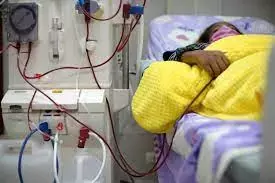- Home
- Medical news & Guidelines
- Anesthesiology
- Cardiology and CTVS
- Critical Care
- Dentistry
- Dermatology
- Diabetes and Endocrinology
- ENT
- Gastroenterology
- Medicine
- Nephrology
- Neurology
- Obstretics-Gynaecology
- Oncology
- Ophthalmology
- Orthopaedics
- Pediatrics-Neonatology
- Psychiatry
- Pulmonology
- Radiology
- Surgery
- Urology
- Laboratory Medicine
- Diet
- Nursing
- Paramedical
- Physiotherapy
- Health news
- Fact Check
- Bone Health Fact Check
- Brain Health Fact Check
- Cancer Related Fact Check
- Child Care Fact Check
- Dental and oral health fact check
- Diabetes and metabolic health fact check
- Diet and Nutrition Fact Check
- Eye and ENT Care Fact Check
- Fitness fact check
- Gut health fact check
- Heart health fact check
- Kidney health fact check
- Medical education fact check
- Men's health fact check
- Respiratory fact check
- Skin and hair care fact check
- Vaccine and Immunization fact check
- Women's health fact check
- AYUSH
- State News
- Andaman and Nicobar Islands
- Andhra Pradesh
- Arunachal Pradesh
- Assam
- Bihar
- Chandigarh
- Chattisgarh
- Dadra and Nagar Haveli
- Daman and Diu
- Delhi
- Goa
- Gujarat
- Haryana
- Himachal Pradesh
- Jammu & Kashmir
- Jharkhand
- Karnataka
- Kerala
- Ladakh
- Lakshadweep
- Madhya Pradesh
- Maharashtra
- Manipur
- Meghalaya
- Mizoram
- Nagaland
- Odisha
- Puducherry
- Punjab
- Rajasthan
- Sikkim
- Tamil Nadu
- Telangana
- Tripura
- Uttar Pradesh
- Uttrakhand
- West Bengal
- Medical Education
- Industry
Oliguria at time of initiating dialysis in critical COVID-19 patients tied to non recovery: Study

In critically ill patients with COVID-19, CKD and oliguria at the time of dialysis initiation were each significantly associated with a lower likelihood of kidney recovery, according to a recent study published in the American Journal of Kidney Diseases.
Acute kidney injury treated with kidney replacement therapy (AKI-KRT) occurs frequently in critically ill patients with COVID-19. The researchers examined the clinical factors that determine kidney recovery in this population. The researchers developed a multicenter cohort study.
4221 adults with COVID-19 not receiving kidney replacement therapy who were admitted to intensive care units at 68 US hospitals with COVID-19 from March 1 to June 22, 2020 (the "ICU cohort"). Among these, 876 developed AKI-KRT after admission to the ICU (the "AKI-KRT subcohort"). The ICU cohort was analyzed using AKI severity as the exposure. For the AKI-KRT subcohort, exposures included demographics, comorbidities, initial mode of KRT, and markers of illness severity at the time of dialysis initiation.
The outcome for the ICU cohort was estimated glomerular filtration rate (GFR) at hospital discharge. A three-level outcome including death, kidney nonrecovery, and kidney recovery at discharge, was analyzed for the AKI-KRT subcohort.
The ICU cohort was characterized using descriptive analyses. The AKI-KRT subcohort was characterized with both descriptive analyses and multinomial logistic regression to assess factors associated with kidney nonrecovery while accounting for death.
The Results of the study are as follows:
Among a total of 4221 patients in the ICU cohort, 2361 (56%) developed AKI, including 876 (21%) who received KRT. More severe AKI was associated with higher mortality. Among survivors, more severe AKI was associated with an increased rate of kidney nonrecovery and lower kidney function at discharge. Among the 876 patients with AKI-KRT, 588 (67%) died, 95 (11%) had kidney nonrecovery, and 193 (22%) had kidney recovery by the time of discharge. The odds of kidney nonrecovery was greater for lower estimated GFR with odds ratios (ORs) of 2.09 (95% CI, 1.09-4.04), 4.27 (95% CI, 1.99-9.17), and 8.69 (95% CI, 3.07-24.55) for CKD GFR categories 3, 4, and 5, respectively, compared to estimated GFR > 60 mL/min/1.73 m2. Oliguria at the time of KRT initiation was also associated with nonrecovery (OR 2.10 [95% CI, 1.14-3.88] and 4.02 [95% CI, 1.72-9.39] for patients with 50-499 and <50 mL urine/day respectively, compared to ≥500 mL urine/day)
Thus, the researchers concluded that lower baseline eGFR and reduced urine output at the time of KRT initiation are each strongly and independently associated with kidney nonrecovery among critically ill patients with COVID-19.
Reference:
Kidney Recovery and Death in Critically Ill Patients With COVID-19–Associated Acute Kidney Injury Treated with Dialysis: The STOP-COVID Cohort Study by Caroline M. Hsu et al. published in the American Journal of Kidney Diseases.
https://doi.org/10.1053/j.ajkd.2021.11.004
Dr. Shravani Dali has completed her BDS from Pravara institute of medical sciences, loni. Following which she extensively worked in the healthcare sector for 2+ years. She has been actively involved in writing blogs in field of health and wellness. Currently she is pursuing her Masters of public health-health administration from Tata institute of social sciences. She can be contacted at editorial@medicaldialogues.in.
Dr Kamal Kant Kohli-MBBS, DTCD- a chest specialist with more than 30 years of practice and a flair for writing clinical articles, Dr Kamal Kant Kohli joined Medical Dialogues as a Chief Editor of Medical News. Besides writing articles, as an editor, he proofreads and verifies all the medical content published on Medical Dialogues including those coming from journals, studies,medical conferences,guidelines etc. Email: drkohli@medicaldialogues.in. Contact no. 011-43720751


